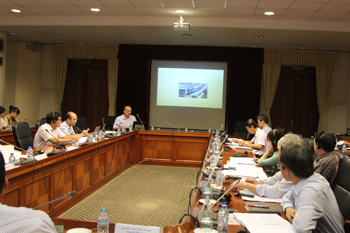Joining in the workshop, Vietnam’s side has Prof. Dr. Nguyen Quang Thuan – Vice President of VASS, Associate Prof. Dr. Nguyen An Ha – Director of Institute of European Studies; Associate Prof. Dr. Chu Duc Dung – Director of Institute of World Economics and Politics; Associate Prof. Dr. Bui Quang Tuan – Director of Institution of Regional Sustainable Development; Associate Prof. Dr. Pham Huu Nghi – Senior researcher of Institute of State and Law; Associate Prof. Dr. Vu Thi Vinh – Former Vice Principal of Hanoi University of Architecture and scientists of research institutes and universities in Hanoi. International representatives have Prof. Detlef Briessen of University of Giessen (Germany); Mr. Hanssen of Center of Development and Environment of Oslo University (Norway) and Mr. Alexander Kenny – Senior Advisor of UNDP in Vietnam.
Having opening speech at the conference, Prof. Dr. Nguyen Quang Thuan – Vice President of VASS has summarized the relationship between Vietnam and European Union since two sides officially had the relationship in 1990. He also pointed out the contribution of VASS as well as Institute of European Studies to promote the bilateral relationship. The Vice President strengthened on the meaning of exchange between scientists so that Vietnam could learn various lessons and experiences for applying in practice as well as the sustainable growth of Vietnam.
The workshop contains two sessions with total 11 research papers on various topics as followed: (1) “Regional Plans from the sustainable aspect: Some theoretical issues” presented by Dr. Tran Thi Tuyet; (2) “Laws on urban plans in Vietnam today” (Associate Prof. Dr. Pham Huu Nghi); (3) “Regional linkage mechanism in Vietnam: Some suggestions from Germany’s and France’s experiences” (Dr. Nguyen Chien Thang); (4) “Future is on two wheels or four wheels? Development, sustainability and urban traffic in Hanoi” (Arve Hanssen & Liv Jorun Andeaes); (5) “Plans and financial sources for green urban development: Ability Analysis and Comparison” (Alexander Kenny); (6) “Houses for city immigrants – EU’s experiences and suggestions for Vietnam (Dr. Tran Thi Phuong Hoa); (7) “Integration of urban traffic plans with land usage towards green traffic: European experiences and lessons for Vietnam’s big cities” (Associate Prof. Dr. Vu Thi Vinh); (8) “Social changes controlling system at regional level in Germany and suggestion for the regional sustainable growth in Vietnam” (Associate Prof. Dr. Dinh Cong Tuan); (9) “Experiences about ecological urban plans in some countries and policy suggestion for Can Tho” (Dr. Nguyen Hong Quang and Luong Thuy Duong); (10) “Rural migration – urban and rural population: studies on industrial workers in North Vietnam (Do Ta Khanh & Bach Hong Van): (11) “Overview of the urban growth policy of European Union (MA. Le Hoang Minh).
|
|
|
 |
Foreign representatives said that Vietnam should not follow the planning pattern of other foreign countries. It is better to have solutions which are based on the social and natural conditions, and then Vietnam could flexibly implement its reforms in order to catch up with the new trends. For this purpose, Vietnam needs to learn from both the failures as well as success of others.
Today, the urban traffic field saw an increase in the number of personal vehicles together with various and new types of transportation, including the existing challenges. European countries offered viewpoints on green traffic. The combined use of public transport, bicycles and walking to make the long way closer due to using many vehicles were successfully organized in Europe and Northern America
Hence, it is a good idea to learn from the Three ways system which is the result of the combination between urban traffic plans and land usage plans. The core area is th system for public transport which has transportation capability with large volume at high speed. The two outside ways are one way and are used for supporting and accessing to houses nearby. Using mixed land for construction could create complex activities. Regions, which are far way from the core area but within a certain distance, will be developed into accommodation with the decrease level of population.
According to Vietnamese experts, a great experience for Vietnam’s big cities is to integrate the urban traffic planning with land usage for a green traffic. In big cities, the traffic jam is the consequence of poor infrastructure, inadequate public transportation and more importantly, the lack of a linkage between land usage and urban traffic planning.
At the workshop, issue on social change controlling system at regional level in Germany is a suggestion for the regional sustainable growth in Vietnam. The system includes a supervision system for population changes, demographic, politics, economics, ideas and culture so on. From the administrative perspective, the state structure is divided into 4 levels including federal, state, region and local. At regional level, those social groups will play a supporting role for high level to monitor social changes. Regional growth has both positive and negative impacts on social changes so the building of a social change controlling system is highly important.
The workshop has received many opinions from participants and there are many new issues raised up which ask for further researches and sharing in next workshops./.
Nguyen Thu Ha







